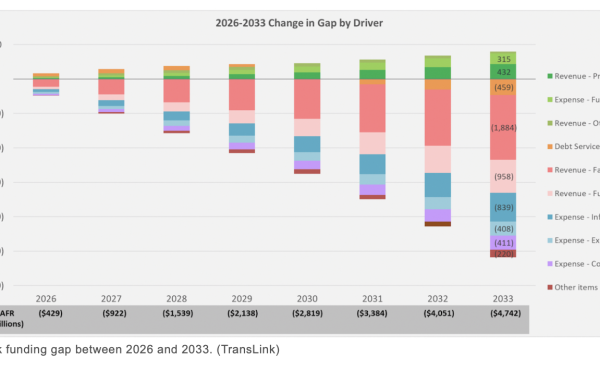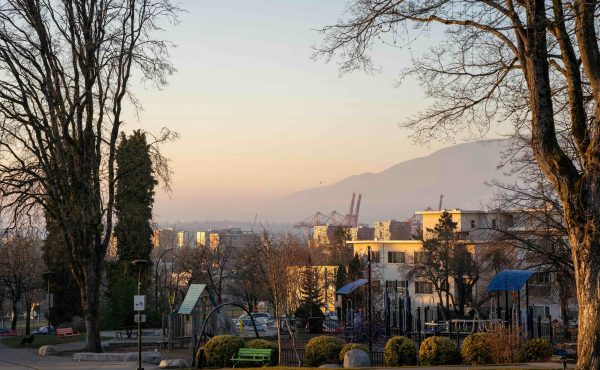

Spacing Vancouver Editor Erick Villagomez and contributors Brendan Hurley and Yuri Artibise continue their lively discussion with Vancouver Park Board Commissioner (and recently announced NDP candidate for the Vancouver False Creek riding!) Constance Barnes and Malcolm Bromley—General Manager of the Vancouver Board of Parks and Recreation—in this, the final installment of a four-part series focusing on the role of parks in the Vancouver. If you missed the first part, you can read it here. Part two is here. Part three is here. A prologue excerpt looking at Emery Barnes Park is here.
•••
Spacing: We hear a lot about the urban development side of things —that’s always at the top of the headlines— but parks are usually below the radar. What are some of the interesting projects that you have on the horizon?
Constance Barnes: One thing I would say is “move, move, move.” When you hear mayor and council say Vancouver is the ‘Greenest City,’ I want Vancouver to be known as the ‘Most Active City.’ It’s working with all those different organizations. It’s tying that in with Tourism BC and Tourism Vancouver and Coastal Health. It’s really about healthy people and looking at what we can do at the Park Board to make sure that we use every opportunity that we have to keep people moving.
One of the cool things that I just did was bats. I got to put the bat houses up. So we have six bat houses at three golf courses. We were handing out cans of Off! for mosquitoes, they were so bad because it’s been so wet. So these bats house 300 female bats, and they come out at night and they eat half their body weight in mosquitoes.
Spacing: <whistles>
Constance Barnes: I know, I like that, you get to eat half your body weight every day! <laughter>. I was making jokes because it’s all female bats. 300 hundred female bats in there all day going “And then… you know what he was doing?!?…” <laughter>
Malcolm Bromley: I think that is the start of how to make our golf courses greener —they are members of the Audobon Society, which measures sustainability— making sure you have good practices for the environment. These are big tracts of green space in an increasing densifying city.
If you go to England and other places, they are in the public trust, and it is mandated that the public should have access to golf courses, to walk through them. If you are in England on a golf course, you can see a stoller go by, even during the British Open. They are safety issues, and you have to be reasonable, but we would like to explore making sure that those are both golf courses that in some of their practices are environmentally very friendly and that they are accessible as a bio-diverse environment for the public. That’s an area we’d like to explore and this [the bat houses] is a starting point.
It’s also the emerging areas along the Fraser River. It’s kind of the last frontier if you think of development in Vancouver. It affords us an opportunity for access to water, but striking a balance between complementary needs. There is industry down there, and there is housing emerging, and there’s recreational requirements. That’s an area that will require creative problem solving. We will be part of that. People now demand access to water, access to green space in their community. The densification down there, I think will be an interesting project.
Orphan spaces [are something] we are working with other city departments on. Pocket parks on little pieces of heretofore unused land. I’ve been thinking and talking with Constance about our dog off-leash challenge. It’s always a challenge to go into a park and say “we’re going to take this corner and dedicate it to dogs,” but we could find these orphan spaces that are just kind of parked out there. We have access to right of ways, that maybe they were thinking of building a road one day, but haven’t. With a little fencing and a couple of trees and benches: Bingo! A pop-up dog off-leash area. Being creative utilises public spaces that are otherwise just sitting out there.
Constance Barnes: Also birds, we’re doing birds. I’m reading the Migratory Bird Day proclamation this weekend [May 12, 2012]. Vancouver has more migratory birds that come here than anywhere else. I honestly didn’t realize how many species Vancouver gets, including our heron up here. We have six walks now, and we’re building. This started as one with Rob Butler, who is a world expert birder.
We are actually tying it into a full day of speaking, it’s almost like a conference happening at the Vancouver Public Library. Vancouver Tourism came up with $5,000. We’ve got all kinds of neat things happening. I didn’t realize how many birders are out there.
Malcolm Bromley: It’s one of the fastest growing activities.
Constance Barnes: It’s huuuge! So we’re looking at building on this, and it actually was Chicago, and Sahdu [Johnston, Deputy City Manager] who has an amazing history with birding is working on that. Each year we’re going to build, and we’re looking at actually having Vancouver host a huge birding convention. This year will be year two and we’re going to build on it, so that hopefully next year we’re going to do three days.
Malcolm Bromley: And that spins off into our policy. We have to rethink the way we do things and be mindful of what we plant and how we prune. There’s certain birds that live in trees, some live in bushes; they need certain conditions. We’ve worked really closely with the bird community to say “teach us” about our practices: what have we done well? what have we done not so well and should stop doing?
That’s how those things spin off into other directions and opportunities. We have the Stanley Park Ecological Society and some other partners. We don’t have to own or do everything. We have an interest in managing it, and ensuring it gets done; but if we can help somebody else do it with a little nudge, and support and resources, let’s do it that way. Let’s have this network of people that are engaged and own this stuff.
Constance Barnes: There’s a big environmental piece too. Birds —rather than using pesticides and stuff— are great for aphids. Pesticides are a tool to increase food production, increased profits for farmers and the prevention of diseases. If pests are ruining property, it’s best to call commercial pest control sydney company. They’re great for all these different pieces, but again, we sit here at the Board, and people come forward with all these different stories, and the positives, and you just have no idea. You run thinking you are going to save a swimming pool, and the next thing you know, you’re nailing up a bat house! Hey I got to use a drill “zzzzt, zzzzt” It was great! <laughter>
Spacing: Given your roles, I’d love to hear what your favourite Vancouver park is and why.
Constance Barnes: That’s kind of a silly question for me! <laughter, as Emery Barnes Park was completed this year> Even if I had another, I don’t know if I would say it. <laughter>
Spacing: Second favourite?
Constance Barnes: You know, one that we didn’t touch on, and where I work everyday —and I don’t know that I’d call it a park— is the. Dr. Sun Yat-Sen Classical Chinese Garden. That’s my full time day job, I’m Sales and Marketing Manager there. It’s absolutely exquisite. it was the first one ever built outside China. Everything there came over from Suzhou, including the 53 artisans who built the space.
It’s got an amazing energy, the Tai Hu rocks, the Yun Wei Ting, all those pieces. I’ve been there over five years, and it is an absolute secret. It’s this gem, but it’s a secret, which is a shame, because we need the revenue <chuckles>. We have amazing programming. We have music in the summer—the Enchanted Evenings concerts. We have theatrical performances there.
Malcolm Bromley: She’s in the marketing department <laugher>
Constance Barnes: But we do so much. It’s one of those things that I’m upstairs in the office and I sometimes need to go downstairs and put my feet on those beautiful pebbles. It’s definitely a favourite space of mine.
Spacing: It’s wonderful.
Constance Barnes: It is; but I’m kinda liking dad’s park too! <laughter> I go there to sit and just reflect and I feel him. I definitely feel him when I’m there. So it’s a very cool thing.
Malcolm Bromley: It’s that emotional connection.
Constance Barnes: It is. He’s right there and he’s saying “Yeah, you did good” or “Gee, you’d better smarten up.” Either way, he’s there. And i know my family goes there as well when they just need to touch base with pops.
Malcolm Bromley: We need to celebrate our heroes, right?
Constance Barnes: We do, and he was definitely a hero. Absolutely.
Malcolm Bromley: Well it’s easy to say Stanley Park, because I’d never seen it before, and there is so much for me to explore, and I live right there—it’s my backyard. I’m right on the property line. But I’d say for impact for me, it’s the little Morton Park, with the A-maze-ing Laughter.
I live in the Denman/Davie area, and I watch the world come to that park and everyone smiling. I cannot go by there and not smile. If I’m having a bad day, even at the office, I’ll walk down there. Little children and just about everybody is animated by that park, taking pictures, striking the poses. It’s just so inspiring. That’s why we are working hard with Vancouver Biennale and others to keep it here, and the Board approved that, so we’ll see a happy landing there. That place really makes me happy.
Spacing: Do you have any closing thoughts you would like to share?
Constance Barnes: Thank-you. I would say thank-you to you for taking the time to come and talk with the Park Board because we don’t have a lot of tragedy here, but we do a lot of really good work and I think we do grand, grand work. So I would just say thank-you, we’re really appreciative to have you come and give us the opportunity to speak about what we do.
It’s not the norm, it really isn’t. We’re not sitting here talking about something tragic, we’re talking about really grand things that keep people happy and healthy and get them out to share their lives in great spaces.
Spacing: Our pleasure.
Malcolm Bromley: I also appreciate the opportunity and let your readers know that we’re open. If they have ideas or thoughts, we are open. We need to manage expectations; we can’t do everything, or everything at the same pace, but I want to hear everything. I want to hear creative ideas.
If people have ideas about how to engage with us please let us know. I learned a lot from the open data community about the potential that has for us. I’m sure some of your audience and readers have some fantastic ideas to help us make our good system better and better. We aspire to be the best in the world. That’s something we talk about. If we can’t do it, who can —with all of the beautiful assets we have? Drop us a line, send us an email. Let us know.
Constance Barnes: In addition to that, I’d say to people “Don’ t be afraid to approach us.” And if you’re kids, or if you’re seniors, that’s who we have to hear from. Don’t be afraid, don’t be scared, we’re one of you. Because even though it can be a little frightening, and a little overpowering —we’re all sitting around this big table— you know what, we’re one of you. That’s how I feel. So don’t be afraid to come down, or pick up a phone (604-873-7000) and let us know what you are thinking, because that’s what it’s all about.
•••
Another heartfelt thanks to Constance Barnes and Malcolm Bromley for taking to time to speak with me, to Brendan Hurley for recording the conversation, and Yuri Artibise for transcribing the interview.
•••
Yuri Artibise is a public policy analyst and social media specialist. Through his Yurbanism brand, he explores the ‘Y’ of urbanism by sharing ways to make our cities more livable, community-oriented places one block at a time. He currently works with PlaceSpeak, an online location-based community consultation platform.
Brendan Hurley is a local urban designer who focuses on planning for adaptive neighbourhood change. His recent work has been internationally focused, but is strongly rooted in his native Vancouver. Living and working out of the heart of downtown, he remains keenly focused on the region’s development and history. Brendan is a regular contributor to Spacing Vancouver, but also consults as director of the UrbanCondition design collective.
Erick Villagomez is the Editor-in-chief at Spacing Vancouver. He is also an educator, independent researcher and designer with personal and professional interests in the urban landscapes. His private practice – Metis Design|Build – is an innovative practice dedicated to a collaborative and ecologically responsible approach to the design and construction of places. You can also see some of his drawing and digital painting adventures at Visual Thoughts.
*
Other Spacing Vancouver and Spacing interviews:
- Downtown in Transition: An Interview with Sean Bailey
- Embracing the Future: An Interview with Kobus Mentz
- Inequality, Gender, Intersectionality, Gentrification, and the City: An interview with Leslie Kern
- Talking Landscape Architecture: An Interview with Marc Treib
- Architecture and Capital in the 21st Century: An Interview with Matthew Soules
- On Interior Urbanism: An Interview with Jeremy Senko
- From Chief Planner to “Urban Ronin”? Chatting about legacy, and the future, with Brent Toderian – Part 1
- From Chief Planner to “Urban Ronin”? Chatting about legacy, and the future, with Brent Toderian – Part 2
- Optimizing Social Connection: An Interview with Saif Khan
- On This Patch of Grass: An Interview with Matt Hern, Daisy Couture, Selena Couture, and Sadie Couture
- THE ARTFUL CITY: An Interview with Sean Martindale
- Vaudeville Vancouver: An Interview with Tom Carter
- Women in Design: An interview with Johanna Hurme of 5468796 Architecture
Living History: An Interview with Eve Lazarus - Where Happiness and Urban Design Intersect
- 2012 InReview: Gregor Robertson Interview
- Malcolm Bromley & Constance Barnes Interview – Part 1
- Malcolm Bromley & Constance Barnes Interview – Part 2
- Malcolm Bromley & Constance Barnes Interview – Part 3
- Malcolm Bromley & Constance Barnes Interview – Part 4
- From Chief Planner to “Urban Ronin”? Chatting about legacy, and the future, with Brent Toderian – Part 1
- From Chief Planner to “Urban Ronin”? Chatting about legacy, and the future, with Brent Toderian – Part 2



